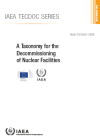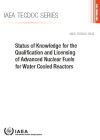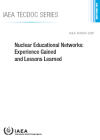Building, collecting, transferring, sharing, preserving, maintaining and utilizing knowledge is essential to developing and keeping the necessary technical expertise and competences required for nuclear power programmes and other nuclear technology. The IAEA helps Member States maintain and preserve nuclear knowledge.
Nuclear knowledge management
Appropriate expertise must be developed and kept available throughout the nuclear technology life cycle. Effective knowledge management helps achieve this objective. Advanced and specialized knowledge in nuclear engineering and science is required for the safe and effective design, construction, licensing, commissioning, operation, maintenance and decommissioning of nuclear technology-based systems, which may have long life cycles in changing contexts.
The safe use of licensed nuclear facilities and technologies is reliant on the ongoing availability and maintenance of suitable knowledge and expertise, including an adequate understanding of related safety issues. The ability of organizations that operate or utilize nuclear technology to take safe decisions and actions can be affected by knowledge gaps or knowledge loss. Appropriate knowledge management methods and supporting technology are needed to establish and manage nuclear knowledge, competencies, information and records, work processes, data interpretation, and analysis and verification techniques.
Power and non-power applications of nuclear technologies require a stable or even growing base of nuclear knowledge and trained human resources, be it in the areas of energy production, cancer treatment or food and agriculture. Nuclear knowledge management has become an increasingly important element of the nuclear sector management in recent years. Countries with existing nuclear programmes need to secure the capacities and human resources necessary to sustain the safe operation of existing installations, including their decommissioning and related programmes for spent fuel and waste. Replacing retiring staff and attracting the young generation to a career in the nuclear field are key challenges. Countries with expanding nuclear power programmes require skilled and trained human resources to design and operate future nuclear installations. Capacity building through education, training and transferring knowledge is essential.
Recognizing the importance of nuclear knowledge management, the IAEA develops methodologies and guidance documents for planning, designing and implementing nuclear knowledge management programmes and facilitates nuclear education, providing support, networking opportunities and experience exchange. The IAEA assists Member States by providing products and services for maintaining and preserving nuclear knowledge and by promoting the use of state-of-the-art knowledge management technologies.








